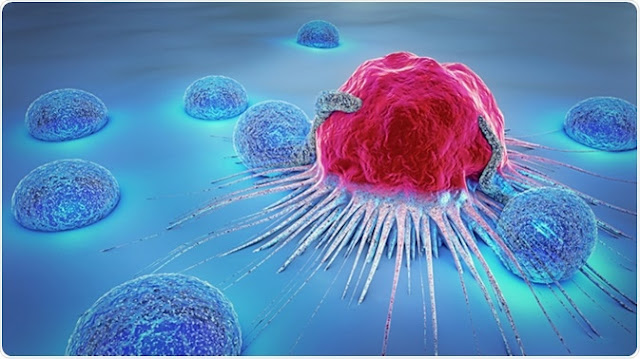Natural Killer Cells; Play an Important Role in Innate Immune Responses to Infection
Natural killer cells, also known as NK cells, are a type of cytotoxic lymphocyte critical to the innate immune system that controls several types of tumors and microbial infections by limiting their spread and subsequent tissue damage. Natural killer cells develop in bone marrow as well as in some extra medullar sites, such as lymph nodes, thymus, liver, and uterus. The NK cell development is controlled by both intracellular and extracellular factors. Natural killer cells were initially thought to develop exclusively in the bone marrow (BM). But, recent evidence in humans and mice suggests that they can also develop and mature in secondary lymphoid tissues (SLTs) including tonsils, spleen, and lymph nodes (LNs).
Natural
killer cells are an important part of the human immune system. In addition
to their role in preventing infections, NK cells also have a key role in
regulating the growth and remodeling of the placenta. In humans, the majority
of NK cells are derived from the lining of the uterus, where they express a
highly fluorescent protein called CD56. These cells play an important role in
placental vascular remodeling and responsible for a host of other functions. In
normal human blood, NK cells produce chemokines that recruit nonhematopoietic
cells to the site of infection. When activated, these chemokines (or
chemotactic cytokines) recruit hematopoietic cells to the tumor and help
eradicate the infected cells.
But, despite their beneficial role in the
body, the anti-tumor properties of NK cells have limited clinical application.
This is primarily because natural killer cells are important in the treatment
of infections. The development and immune recognition of natural killer cells
are regulated critically by major histocompatibility complex (MHC) class I
molecules. However, it remains unclear whether the function of NK cells is
regulated by MHC class II molecules. The NK cell acquires this antigen through
interactions with the actin cytoskeleton and plasma membrane. The molecules are
not involved in NK-mediated lysis of human leukemic blasts. The discovery will
improve the understanding of immune evasion and improve the ability to cure
disease.
The role of NK cells in the immune system
has been widely recognized as being important in controlling viral infections
and removing cancer cells. Natural killer cells are lymphocytes that were first
identified for their ability to kill tumor cells without deliberate
immunization and/or activation. Knowledge of NK cell biology is continuously
expanding. Recent studies show that the development of natural killer cells is
dynamic, and is imperative to understand their effector function for the
development of new immunotherapies and the prevention of infections. With the
discovery of natural killer cell immunological memory, a host of new questions
have emerged about the innate immune system.
Natural killer cells act as an important
component of the innate immune system of a human. The key role of these cells
is to generate an immune response against malignancies and viral infections. NK
cells help kill virally infected cells, as well as to detect and control early
signs of cancer. As innate immune cells, NK cells are unique and perform
important functions in cancer immune surveillance. Moreover, these cells are
essential for the defense against viral pathogens and are involved in tumor
surveillance, atopic diseases, and many autoimmune and inflammatory disorders.



Comments
Post a Comment